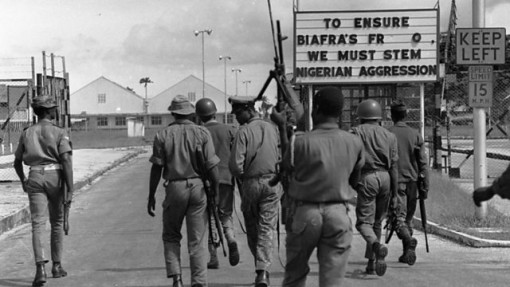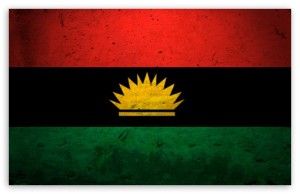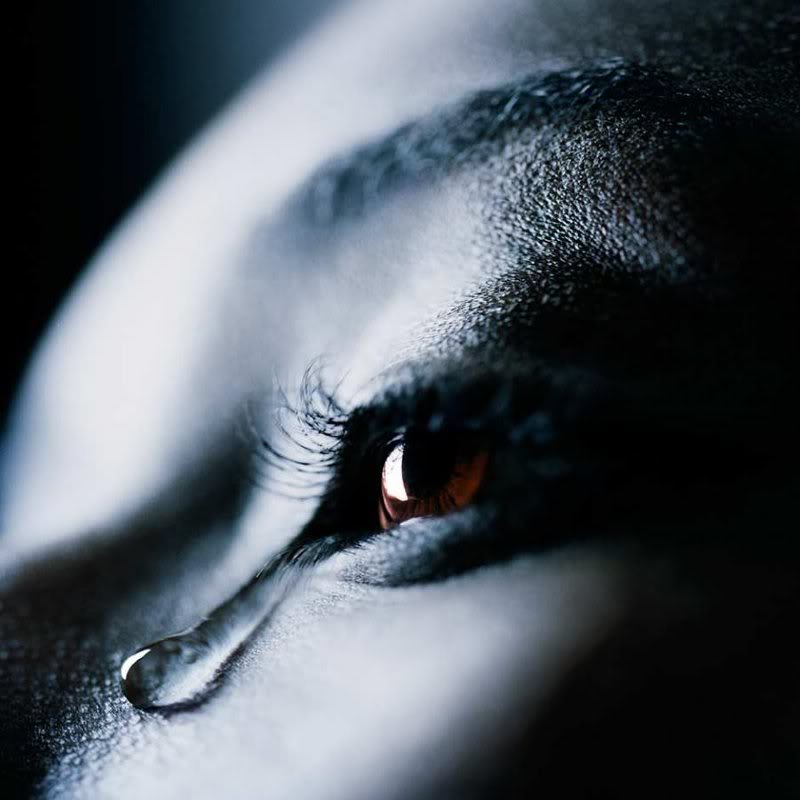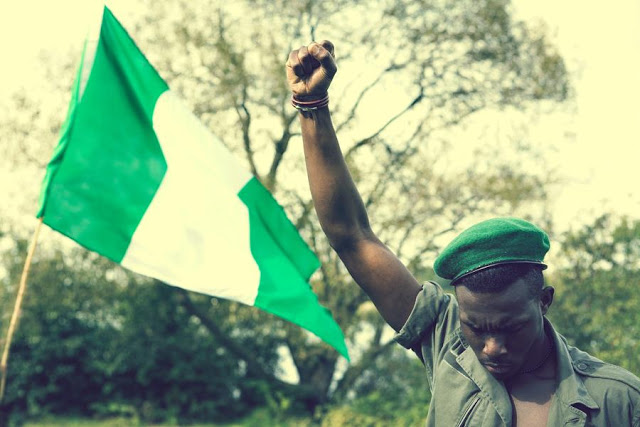Written by Euphemia Udanoh
Of late, the word Biafra has carried an element of terror for some people in Nigeria, especially those from the north and south western part of the country. Why, I ask?
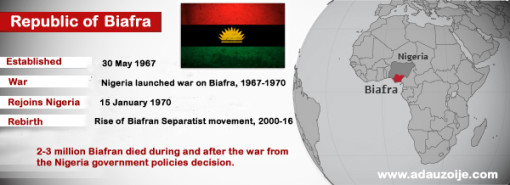 What is anyone afraid of when Biafra is mentioned?
What is anyone afraid of when Biafra is mentioned?
Is it so difficult for these Nigerians, who stand against the rebirth of the Republic of Biafra, to understand the forever plight and non-equality that Biafrans had suffered giving up their country and re-joining Nigeria since 1970? It’s been 45 years since the Eastern Nigerian, predominantly the Igbo tribes, lost the war to keep their country, Biafra, and today the new generation of Biafrans want their country back. Nothing has changed since re-joining Nigeria, and Biafrans are still worse off now than when they fought for their freedom from Nigeria between 1967-1969. The root causes of the war are still very visible, if not worse, and the Nigerian leaders have shown no concern for the plight of the Biafrans. This attitude from the Nigeria leaders, a nation that the Biafrans were forced into by the British and of which they lost over 3 million of their people trying to wrestle away from her, is what has led to the recent 2015 agitation from the Biafrans to secede from Nigeria.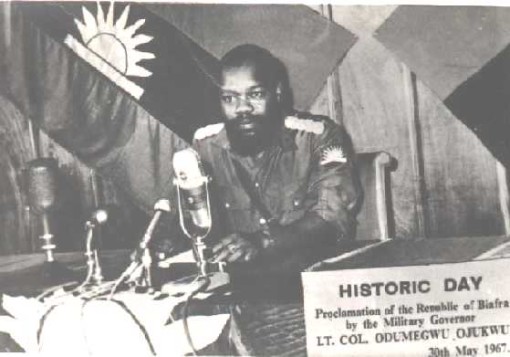
Not only did Biafra lose her children in the genocide and from the invasion against her by the Nigerian military with the backing of other world powers from the West of the continent, but they lost virtually all they had in the Nigerian banks. For the thousands of pounds the Biafrans had in the Nigerian banks, they were only given a paltry £20 each to restart their life after the war. With the kwashiorkor and massive infrastructure rot in their land, many Biafrans who survived the war died from the suffering, starvation and disappointment of losing all their money to Nigeria, even after the NO VICTORY and NO VANQUISH.
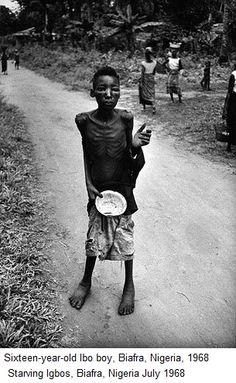 Worse was when the 1970 3Rs Gowth initiative – Reconciliation, Rehabilitation and Reconstruction – started from the South West Lagos, where the war was not fought and nothing was done in the war-torn South East of Nigeria. The South West witnessed increased infrastructural developments like the construction of the third mainland bridge in Lagos, the longest bridge in West Africa, while the Niger bridge in the Biafra region managed to receive only two lanes with the promise of a second bridge never met. The sorry state of the roads in the old Eastern region is evidence of the neglect of the Biafrans by the Nigeria federal government since the end of the civil war in 1970. History has it that the roads were in good shape and considered some of the best in density in the sub-Sahara Africa before the war damaged them. The roads and their economy were still good until 1983, which is when the Northerner General Muhammadu Buhari (Current Nigeria President) took over through a coup on 31st December 1983, and unleashed hate on the South East zone. Buhari used Late Ike Nwachukwu, whom he appointed as his own proconsul, to truncate the positive plans of Late Gov. Sam Mbakwe of Imo state, which saw the dismantling of all the 42 industrial installations embarked upon by Sam Mbakwe, which were at various stage of development and to which the government had made financial commitments. In a nutshell, the Ike Nwachukwu “Imo formula” initiative did more harm than good to the old Eastern region, especially in the area of university education where he had to consolidate the Imo state university under a single campus at Uturu, near his home town, as opposed the 5 campus design by Sam Mbakwe to stimulate strategic developments.
Worse was when the 1970 3Rs Gowth initiative – Reconciliation, Rehabilitation and Reconstruction – started from the South West Lagos, where the war was not fought and nothing was done in the war-torn South East of Nigeria. The South West witnessed increased infrastructural developments like the construction of the third mainland bridge in Lagos, the longest bridge in West Africa, while the Niger bridge in the Biafra region managed to receive only two lanes with the promise of a second bridge never met. The sorry state of the roads in the old Eastern region is evidence of the neglect of the Biafrans by the Nigeria federal government since the end of the civil war in 1970. History has it that the roads were in good shape and considered some of the best in density in the sub-Sahara Africa before the war damaged them. The roads and their economy were still good until 1983, which is when the Northerner General Muhammadu Buhari (Current Nigeria President) took over through a coup on 31st December 1983, and unleashed hate on the South East zone. Buhari used Late Ike Nwachukwu, whom he appointed as his own proconsul, to truncate the positive plans of Late Gov. Sam Mbakwe of Imo state, which saw the dismantling of all the 42 industrial installations embarked upon by Sam Mbakwe, which were at various stage of development and to which the government had made financial commitments. In a nutshell, the Ike Nwachukwu “Imo formula” initiative did more harm than good to the old Eastern region, especially in the area of university education where he had to consolidate the Imo state university under a single campus at Uturu, near his home town, as opposed the 5 campus design by Sam Mbakwe to stimulate strategic developments.
Igbos has been underrepresented in Nigerian politics since the dissolution of Biafra in 1970. The marginalization and intimidation of the Igbos politicians and civil servants in Nigeria could be seen in how the army chief, Ihejirirka, was treated when he headed the fight against Boko Haram in the North of Nigeria. Ihejirirka was accused of war crime and crimes against humanity committed in the battle against Islamist extremist insurgents. However, in 2015, a Northern army leader ordered the killing of over 300 Shiite Muslims in Zaria, and he didn’t face the same justice as the Igbo chief Ihejrirka was subjected to!
Tales of the war and of the subsequent wickedness of other tribes to the Igbos is a sensitive subject most Igbo parents never forget to tell their children. It had become a seed as the older generation watched history repeat itself and which has today germinated into the aggressive agitation from the Biafran youths to leave Nigeria for their own republic, where they can manage their resources and not have to suffer the indignity of being marginalized. The youths believed that if Biafra comes, the needed infrastructural developments that will aid business in the south East and South Nigeria, like seaports, foreign embassies and good roads, would be put in place.
Many political scholars and concerned Nigerians have called on the Nigerian government at different times to see to the rehabilitation and compensation of the Igbos to ease the effects of the war, but nothing has been done to appease the living and the dead in that region since 1970. The marginalization that led to the first war is still there and biting harder than ever, which has led to the creation of Radio Biafra in London by a Nigerian youth activist, Nnamdi Kanu. Ex-president Jonathan Goodluck, an Easterner, started the construction of the second Niger bridge, but the project was cancelled by the Northerner President Buhari in 2015 shortly after he took over power. Indeed, this was another prime example of Federal Government failing to develop the Biafra region in Nigeria.
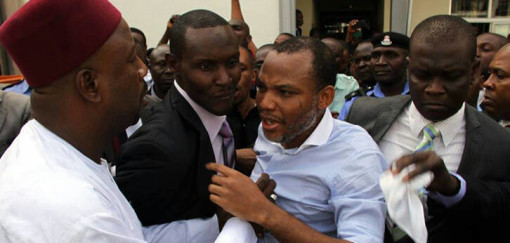
Nnamdi Kanu Founder of Radio Biafra
It’s no longer questionable whether the Igbos truly meant to separate from Nigeria, especially after the massive 2015 nationwide protest that followed the arrest of the London based Radio Biafra director, Nnamdi Kanu, by the Nigerian government on October 17th 2015 in his hotel room in Ikeja, Nigeria. The Indigenous People Of Biafra(IPOB) 2015 protests saw millions of Biafran youths from all works of life, calling for a referendum and the unconditional release of the Biafra spokesman and Radio Biafra director. Yet instead of suing for dialogue, the Nigerian government used force and many unarmed protesters were murdered for failing to leave the roads, an act that’s validated their belief that they are not safe in Nigeria. The Federal High Court and Magistrate Court have severally granted bails for the release of Mr Kanu, an order the Department State Service (DSS) has failed to honour. It’s evident that DSS are above the law and abused their power in refusing to respect Kanu’s human right to be released from jail as instructed by the court.
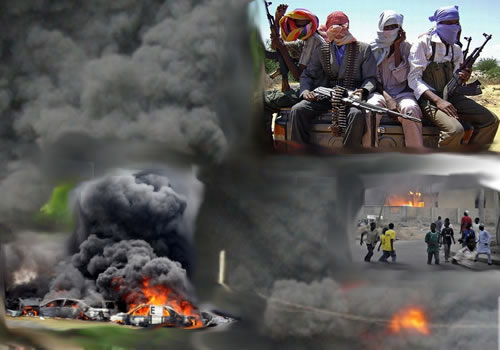
Igbo resident in the Northern region of Nigeria are been targeted daily by the Northern Islamic extremists, Boko Haram.
Of all the tribes in Nigeria, the Igbos tribe, comprised predominantly of Christians, have experienced more death in the Northern Islamic extremist part of Nigeria and rarely has anyone been held accountable for this reoccurring violence.
WAY FORWARD…
Enough said, we have to move on and not dwell in the past. This will only be possible if the United Nations and the Nigerian government respects the right of the Igbo people and grants them a referendum to test the strength of their decision. Nigeria leaders should end all forms of marginalization and intimidation and oblige to the law of the nation. It’s only going to be peaceful as we sojourn in this 2016, if the Nigerian government understands that it’s the right of the Biafrans/igbos to self determination and respects this without incarcerating and killing those who stand up for a Biafran state. There could be an alternative as it is with everything in life, but that must be offered by the federal government to the Biafrans and see if they could make do with it.
I wish for so many things for the Biafrans/Igbos, but above all…
I wish that in the coming year and years, the Igbos would understand that home (South East/South) is where to plant their investment.
I wish that in the coming years, the Igbos would understand that with or without the rebirth of Biafra, that they can develop their states regardless.
I wish that in the coming years, the Igbos will consolidate their relationship with the South and leave no room for those who use divide and conquer tactics to hinder their growth.
I wish that in the years to come, that Igbos would kill corruption and illicit business engagements that have garbed their identity as caused by some bad elements within the tribe.
I wish that in the year and years to come, the politicians in Igboland and South will understand that their loyalty and service should lie with their people and be for them, not with the Hausas.
I wish in the year and years to come that the MASSOB and IPOB groups should understand that their unity is what will determine the unity of Biafra Republic when it finally comes.
The Igbos were Biafrans before they became Nigerians, therefore, there’s no need to give up on the quest for the rebirth of the Biafra Republic. Biafra is the identity of every southern easterner and some part of the south, and killing Biafra would amount to killing their history and identity. The Igbos have fought a war for their freedom in the past and that must not beallowed to repeat itself. Everyone in Nigeria today that’s affected in one way or another by this period of agitation for a Biafran state must try to walk and work in line with the laws of the U.N and Nigeria in areas of human right preservation and respect to the rule of law, to avoid a repetition of 1967 and the worst of it, as many things have changed over time. I must also add that it won’t be an easy war for both parties if we don’t give peace a chance.
I say, LONG LIVE THE LAND OF THE RISING SUN; BIAFRA… Together we can!
About the Author
Euphemia Udanoh is an Igbo novelist. Royal Kiss and Frenemies are her first novels. She is an enthusiastic reader, a revivalist and a dedicated mother.
Click here to order Frenemies

